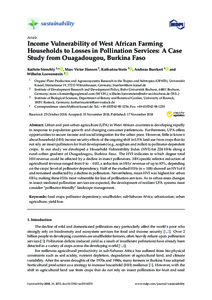Income Vulnerability of West African Farming Households to Losses in Pollination Services: A Case Study from Ouagadougou, Burkina Faso
| dc.date.accessioned | 2019-02-05T12:24:45Z | |
| dc.date.available | 2019-02-05T12:24:45Z | |
| dc.date.issued | 2018-11-17 | |
| dc.identifier | doi:10.17170/kobra-20190204144 | |
| dc.identifier.uri | http://hdl.handle.net/123456789/11060 | |
| dc.description.sponsorship | Gefördert durch den Publikationsfonds der Universität Kassel | ger |
| dc.language.iso | eng | |
| dc.rights | Urheberrechtlich geschützt | |
| dc.rights.uri | https://rightsstatements.org/page/InC/1.0/ | |
| dc.subject | food crops | eng |
| dc.subject | pollinator dependency | eng |
| dc.subject | smallholder | eng |
| dc.subject | sub-Saharan Africa | eng |
| dc.subject | urbanization | eng |
| dc.subject | urban agriculture | eng |
| dc.subject | yield loss | eng |
| dc.subject.ddc | 630 | |
| dc.title | Income Vulnerability of West African Farming Households to Losses in Pollination Services: A Case Study from Ouagadougou, Burkina Faso | eng |
| dc.type | Aufsatz | |
| dcterms.abstract | Urban and peri-urban agriculture (UPA) in West African countries is developing rapidly in response to population growth and changing consumer preferences. Furthermore, UPA offers opportunities to secure income and social integration for the urban poor. However, little is known about household (HH) income security effects of the ongoing shift in UPA land use from crops that do not rely on insect pollinators for fruit development (e.g., sorghum and millet) to pollinator-dependent crops. In our study we developed a Household Vulnerability Index (HVI) for 224 HHs along a rural–urban gradient of Ouagadougou, Burkina Faso. The HVI indicates to which degree total HH revenue could be affected by a decline in insect pollinators. HH specific relative reduction of agricultural revenue ranged from 0 to −0.83, a reduction in HHs’ revenue of up to 83%, depending on the crops’ level of pollinator dependency. Half of the studied HHs (n = 108) showed an HVI of 0 and remained unaffected by a decline in pollinators. Nevertheless, mean HVI was highest for urban HHs; making these HHs most vulnerable for loss of pollination services. As in urban areas changes in insect-mediated pollination services are expected, the development of resilient UPA systems must consider “pollinator-friendly” landscape management. | eng |
| dcterms.accessRights | open access | |
| dcterms.creator | Stenchly, Kathrin | |
| dcterms.creator | Hansen, Marc Victor | |
| dcterms.creator | Stein, Katharina | |
| dcterms.creator | Buerkert, Andreas | |
| dcterms.creator | Loewenstein, Wilhelm | |
| dc.relation.doi | doi:10.3390/su10114253 | |
| dc.type.version | publishedVersion | |
| dcterms.source.identifier | EISSN: 2071-1050 | |
| dcterms.source.issue | 11 | |
| dcterms.source.journal | Sustainability | eng |
| dcterms.source.pageinfo | 4253 | |
| dcterms.source.volume | 2018, 10 |
Dateien zu dieser Ressource
Das Dokument erscheint in:
-
Artikel [1104]

